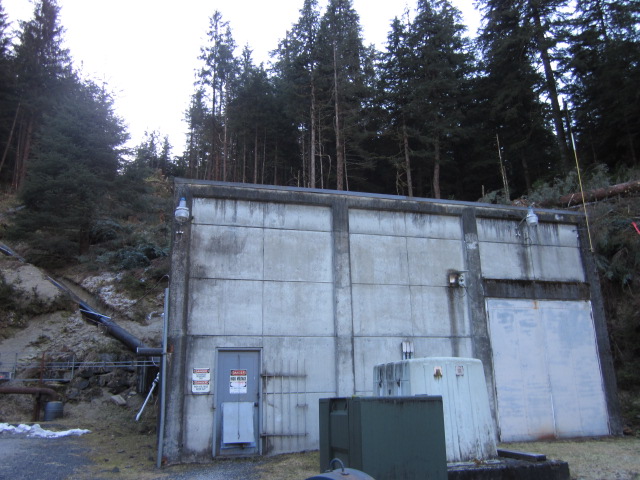
Petersburg’s utility director Monday reported to the borough assembly about potential electrical rate hikes needed to repay a proposed 7.8 million dollar bond issue. That bond debt would pay for an overhaul of the borough’s hydroelectric plant and an additional diesel generator. Rates may have to go up even more if the borough decides to let its cheapest source of power break down.
Utility director Karl Hagerman is making the case for the bond issue, which is expected to go before voters in October. It would authorize borrowing up to 7.8 million dollars. Customers of the electric utility would pay that back, likely over 25 years. And it will mean higher electrical bills.
“Nobody likes a rate increase,” Hagerman said. “I don’t like a rate increase but it is a fact of life that critical infrastructure must be renewed from time to time. The forethought of Blind Slough for instance was huge. People have saved money that they don’t even realize because of that facility going on and on. We need to renew that so that we can provide benefits to the community for many more years.”
The borough would use the bond issue to pay for an overhaul of most of the generation equipment at the borough’s hydro plant at Blind Slough on southern Mitkof Island. It would also buy an additional standby diesel generator to meet increasing demand from the community.
Hagerman presented some numbers from D. Hittle and Associates, the consulting firm studying Petersburg’s electrical rates.
“It basically is a fair way of splitting out what we’ve built and who it benefits via customer class,” he explained. “So we did find that the large commercial customers are paying actually more than their fair share by ten percent and subsidize other rate classes. And the municipal rate that we have in place right now is heavily subsidized by other customer classes.”
The school district and some borough departments pay that municipal rate, less than the cost of power for homes and businesses. The decision on how to increase rates will come at some later date and depends on whether voters approve the bond issue. But to pay back the bond debt and cover other costs the utility says it needs to increase revenue nine and a half percent this year and the same amount next year.
Under one possible scenario, the average monthly bill for a home could go up by $15.35 the first year and the same amount the second year. The increases for businesses could be around 105 dollars a month both years. And large commercial customers could see bills go up by around 258 dollars a month both this year and next. Hagerman told the assembly that two years of rate hikes would still leave Petersburg with electrical rates comparable to other Southeast communities on hydro power.
The rate study is also taking into account several increased costs that are expected whether or not Petersburg bonds for this project. The Southeast Alaska Power Agency is planning to consider an increase to the cost of Swan Lake and Tyee Lake hydroelectricity. And that agency is no longer paying rebates to Ketchikan, Petersburg and Wrangell. Petersburg has used that money to cover the cost of running diesels during annual hydro maintenance shutdowns.
The borough has hired other consultants to look at the condition of Blind Slough and plan for standby diesel needs. Hagerman made clear it’s not an all or nothing decision on maintaining the Blind Slough hydro plant.
“If the bond isn’t approved, it’s not like the facility is going to fail the next day and it won’t be available to us,” he said. “So, I did want to temper this discussion with some facts that, we would, if there’s no support to rebuild Blind Slough from the assembly or the voters, we would nurse it along, we would do smaller projects that we could afford to keep it going for as long as possible.”
He did caution going down that road eventually would lead to a catastrophic failure at the plant. And without that hydro, the borough would have to boost its standby capacity with additional diesel generators. Hagerman noted future rate hikes would have to cover that cost and the cost of buying more electricity from the Southeast Alaska Power Agency.
“Because of the increased cost in power purchasing, increased cost in fuel purchasing, increased maintenance and of course the larger diesel generators needed to take the place of Blind Slough, instead of a 19 percent increase over two years, we’d look at a 23 percent increase,” Hagerman said. “It really, as I said, it was good for me to go down this road because it just points to the fact that Blind Slough is so important, we get so much out of this hundred year old facility that is just cranking along providing really low cost power to the utility and it helps our customers greatly.”
The power from Blind Slough, generated from the waters of Crystal Lake, is Petersburg’s cheapest source of electricity. And that’s still the case factoring in the cost of the overhaul. It provides about a quarter of Petersburg’s energy.
The assembly had questions about the possibility for federal infrastructure funding to pay for the work, longevity of the rebuilt plant and the potential for increasing the capacity of that hydro resource.
The assembly passed the second reading of an ordinance that will put the bond measure on the October ballot. It needs one more approval before heading to a public vote.









